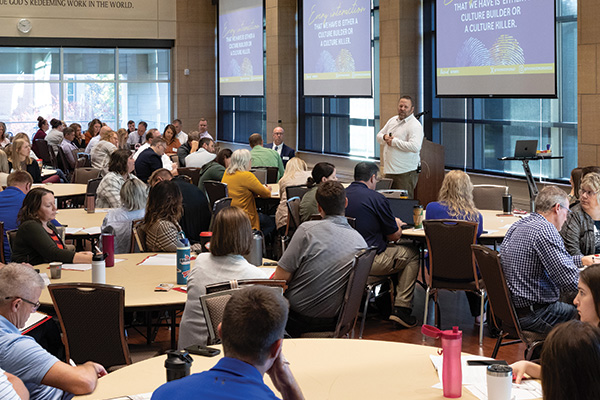Posted on

Every day, school counselors show up as listeners, encouragers, problem-solvers, and advocates for students who need someone in their corner. During National School Counseling Week, we pause to recognize the life-changing impact these professionals have on students’ academic success, personal growth, and future goals.
School counselors are the steady presence in the middle of a student’s storm. They help a first grader navigate big emotions, guide a middle schooler through friendship struggles, and support a high school senior making decisions that will shape their future. Their work may not always be visible, but its influence lasts a lifetime.
In a world where students face increasing academic pressures, mental health challenges, and social complexities, school counselors serve as a crucial bridge between students, families, and educators.
Advocates, Leaders, and Difference-Makers
School counselors are advocates who work behind the scenes to ensure every student — regardless of background or circumstance — has access to opportunities and support. They collaborate with teachers, administrators, and families to create school environments where students feel safe, valued, and heard. Their impact goes beyond graduation rates or test scores. Counselors help students believe in themselves, see possibilities for their future, and develop the skills they need to thrive in life.
A Calling That Changes Lives
For many school counselors, the profession is more than a job — it’s a calling. It requires compassion, cultural awareness, strong communication skills, and a deep commitment to student well-being. It’s challenging work, but it’s also incredibly meaningful.
As we celebrate National School Counseling Week, we thank the counselors who show up every day ready to listen, guide, and uplift the students who need them most. Schools are stronger because of you, and students’ lives are better because you chose this path.
Inspired to Make a Difference?
If you feel called to support students’ academic, career, and personal growth, a career in school counseling offers the chance to create lasting impact every single day.
Northwestern College’s M.A. in School Counseling program is designed to prepare compassionate, skilled professionals to serve students in K–12 settings. Through a blend of practical experience, expert faculty mentorship, and a strong ethical foundation, the program equips future counselors to meet the complex needs of today’s students with confidence and care.
Because one caring adult can change a student’s story — and that adult could be you.
Posted on

The field of education is constantly evolving. Classrooms are changing, student needs are becoming more diverse, and the work of educators continues to expand in important ways. For teachers who want to grow, lead, and make an even greater impact, continuing education isn’t just beneficial, it’s a powerful investment in their future.
Whether through a Master of Education (M.Ed.) degree, an endorsement, or a specialized certificate, advanced credentials help educators strengthen their skills, expand career opportunities, and increase their long-term professional security.
They Open Doors to Career Advancement
Many leadership and specialized roles in education require more than an initial teaching license. An M.Ed. degree, endorsement, or certificate can qualify educators for positions such as:
- Instructional coach
- Curriculum or instructional leader
- Reading or special education specialist
- Administrative pathways (with additional licensure)
- Avenue for teaching at the college level
Even when not required, advanced credentials make educators stronger candidates for promotions and leadership responsibilities within their schools and districts. They signal commitment, expertise, and readiness to take on greater influence.
They Increase Earning Potential
In many districts, salary schedules reward teachers for earning advanced degrees, endorsements, or graduate credits. Over time, these increases can significantly outpace the cost of the program itself. In this way, continuing education becomes more than professional development — it becomes a long-term financial investment with measurable return, especially from a program like Northwestern’s where the tuition costs are among the most affordable in the region.
They Build Specialized Skills Schools Need
Today’s classrooms are more diverse than ever, and schools are looking for educators with targeted expertise. Endorsements and certificates allow teachers to develop skills in high-need areas. These focused credentials don’t just strengthen a résumé; they equip educators with practical tools they can apply immediately to better serve their students.
They Provide Greater Job Security
School systems consistently need educators who can wear multiple hats. Teachers with additional endorsements or advanced degrees often have more flexibility in the roles they can fill, making them invaluable to their districts. This versatility can lead to:
- More stable employment
- Broader teaching assignments
- Increased resilience during staffing or enrollment shifts
In a changing educational landscape, adaptability is a major asset.
They Strengthen Confidence and Classroom Impact
Beyond titles and pay scales, many educators pursue advanced education for a simpler reason: they want to be better at what they do. Graduate coursework and specialized training help educators:
- Deepen their understanding of how students learn
- Use data more effectively
- Implement evidence-based instructional strategies
- Support students with diverse academic and social-emotional needs
The result is often renewed confidence, stronger classroom outcomes, and a deeper sense of purpose in their work.
They Fit Into the Lives of Working Educators
Northwestern’s M.Ed. programs, endorsements, and certificates are designed with working professionals in mind. Flexible, 100% asynchronous make it possible to continue teaching full-time while earning a new credential. This means educators don’t have to pause their careers to move them forward.
An Investment That Pays Off in More Ways Than One
Pursuing an M.Ed., endorsement, or certificate is about more than adding letters after your name. It’s about growth, as an educator, a leader, and an advocate for students.
For educators who want to expand their opportunities, strengthen their impact, and build a more secure future in education, advanced credentials are one of the most valuable steps they can take.
Ready to explore your next step in education? Learn how our graduate education programs, endorsements, and certificates are designed to support working educators and help you reach your professional goals. View programs here.
Posted on

A new semester brings fresh opportunities—new goals, new classes, and new momentum. Whether you’re returning to your program or starting as a new student, the start of a new term is the perfect time to reset, refocus, and recommit to your academic journey.
Online learning offers flexibility and independence, but success doesn’t happen by accident. It’s built through intentional habits, strong organization, and a willingness to engage. Here are practical, proven strategies to help you thrive this semester—no matter where you are in your program.
1. Start With Clear Goals
Before coursework ramps up, take time to define what success looks like for you this semester. Write your goals down—whether it’s maintaining a certain GPA, staying on top of weekly assignments, or balancing school more effectively with work and family. Clear goals give purpose to your daily efforts. Ask yourself:
- What do I want to accomplish academically?
- How does this semester move me closer to my long-term goals?
- What challenges did I face last term, and how can I address them now?
2. Create a Consistent Weekly Schedule
One of the biggest advantages—and challenges—of online learning is flexibility. Structure is key. Consistency reduces stress and helps prevent last-minute cramming, especially when multiple deadlines overlap.
- Block out dedicated study times each week
- Treat online coursework like an in-person class commitment
- Schedule time for reading, discussions, assignments, and exam prep
- Build in buffer time for busy weeks
3. Stay Organized From Day One
Getting organized early sets the tone for the entire semester. Staying organized allows you to focus more energy on learning—and less on scrambling.
- Review all syllabi in the first week
- Add important deadlines to a digital or paper calendar
- Create folders (digital or physical) for each course
- Track discussion posts, quizzes, and major assignments
4. Engage Actively With Your Courses
Online learning is most effective when you’re an active participant. Engagement deepens understanding and helps you feel more connected—to the content, your classmates, and your instructors.
- Log in regularly, even on non-assignment days
- Participate thoughtfully in discussion boards
- Ask questions when concepts aren’t clear
- Connect course material to real-world experiences
5. Communicate Early and Often
You are not alone in your online program. Faculty and support staff want you to succeed—but communication matters. Proactive communication builds confidence and prevents small issues from becoming bigger obstacles.
- Reach out to instructors with questions or concerns
- Ask for clarification before deadlines pass
- Notify instructors early if challenges arise
- Take advantage of academic support services
6. Balance School, Life, and Well-Being
Many online students juggle coursework alongside careers, families, and other responsibilities. Balance is essential. Remember: consistency matters more than perfection.
- Set realistic expectations for yourself
- Break large assignments into manageable steps
- Protect time for rest, exercise, and personal commitments
- Celebrate progress, not just final outcomes
7. Stay Connected to Your “Why”
Whether you’re pursuing a degree to advance your career, serve others, or reach a personal milestone, your “why” matters. When motivation dips—as it sometimes will—pause and reflect on:
- Why you started this program
- Who you’re doing this for
- How far you’ve already come
A Fresh Start for a Successful Semester
The new semester is a chance to begin again—with clarity, confidence, and renewed purpose. Online learning requires discipline, but it also offers incredible opportunity. By staying organized, engaged, and connected, you can make this semester one of growth and success.
Welcome back, and best wishes for a rewarding and successful spring term.
Posted on
Each year on Veterans Day, we pause to honor the men and women who have served our country with courage, sacrifice, and dedication. As a Physician Assistant program, this day holds special meaning. The PA profession itself was born out of the military, shaped by the service and experience of medics and corpsmen who cared for soldiers in some of the most challenging conditions imaginable.
How It All Began
In the years following World War II and the Vietnam War, thousands of military medics returned home with extensive medical training and hands-on experience treating patients in the field. Yet, despite their advanced skills, few opportunities existed for them to continue using those abilities in civilian healthcare.
Dr. Eugene Stead Jr. of Duke University recognized this gap. In 1965, he launched the first Physician Assistant program, training four former Navy corpsmen to extend the reach of physicians and improve access to care. These veterans became the first PAs, pioneering a new profession rooted in service, teamwork, and adaptability.
A Legacy of Service
That same spirit continues to define the PA profession today. Whether serving in the military or in various settings across America, PAs are known for stepping into places of need. The profession’s foundation in the military has shaped its emphasis on collaboration, flexibility, and mission-driven care—values that align closely with our calling here at Northwestern College.
Our program exists to equip PAs who serve patients in rural and underserved communities, demonstrating the same selflessness and commitment that characterized those early military medics. We believe healthcare is an opportunity to bring hope and healing to others, just as those first PAs did decades ago.
Honoring Those Who Serve
This Veterans Day, we not only thank those who have worn the uniform but also recognize how their service continues to shape medicine today. Many veterans choose to continue their mission of care through the PA profession, carrying forward a legacy that continues to impact and serve.
To all who have served—thank you. Your dedication has not only protected our freedom but also helped build a profession that embodies compassion, courage, and service.
Posted on
Honoring a decade of growth, innovation, and lifelong learning.
This year, Northwestern College celebrates a major milestone, the 10-year anniversary of its Graduate and Professional Studies division. What began as a vision to expand access to high-quality, Christ-centered education for working professionals has become a thriving division serving learners across the country through flexible, relevant, and mission-driven programs.
Laying the Foundation for Online Learning
Northwestern’s commitment to lifelong learning took a significant step forward in 2011 with the hiring of the College’s first director of online learning. This marked the beginning of an intentional effort to bring Northwestern’s distinctive education to students beyond the traditional classroom.
In 2013, the College launched its first fully online program, an RN to BSN program, designed to empower registered nurses to advance their education and careers while continuing to serve their communities.
A New Era: Graduate Studies Begin
Momentum continued to build, and in 2015, Northwestern received approval from the Higher Learning Commission (HLC) to offer fully online master’s degrees. This opened the door for the launch of the Master of Education programs, officially establishing the Graduate School and
Adult Learning division. This moment marked the start of a new chapter in Northwestern’s history, one that expanded its reach, deepened its academic offerings, and reaffirmed its mission to equip students to serve God and others in their professions.
Expanding Programs and Impact
Over the past decade, the division has grown to include a variety of graduate and professional programs designed for students seeking advancement, career change, or deeper purpose in their work. Today, the division, now know as Graduate and Professional Studies, offers:
- Bachelor of Arts in Early Childhood Education
- Graduate level endorsement programs
- Graduate level certificate programs
- Master of Arts in Clinical Mental Health Counseling
- Master of Arts in School Counseling
- Master of Business Administration
- Master of Education programs in several specializations
- And Northwestern’s first on-campus master’s program, the Master of Science in Physician Assistant Studies program
Each of these programs reflects the College’s commitment to combining academic excellence with faith integration and real-world relevance, preparing students to make a meaningful impact in their communities and professions.
Looking Ahead
As Northwestern celebrates 10 years of graduate and professional education, the College remains dedicated to the same mission that inspired its beginning: to make Christ-centered education accessible, practical, and transformative for lifelong learners.
The story of Graduate and Professional Studies at Northwestern is one of faithfully stewarding God’s provision, leading to innovation, growth, and confidence in the power of education to change lives. And as the next decade begins, that mission continues, entrusted with the opportunities to serve others.
To learn more about the programs offered through Northwestern’s Graduate and Professional Studies division, click here.
Posted on

What to Expect
On Tuesday, October 21, 2025, Northwestern College’s Graduate & Professional Studies Division is proud to host the annual Leadership in Education Conference, themed Rooted in Culture, Rising in Success. This full-day professional development event (8:20 a.m. – 3:45 p.m.) brings together K–12 leaders, administrators, instructional coaches, and teacher leaders for a day of inspiration, strategy, and networking.
Why This Conference Matters Now
The educational landscape is changing quickly. From the growing importance of school culture to the rise of AI, data use, inclusive practices, and crisis leadership, leaders need more than theory, they need practical strategies grounded in real challenges. This conference is designed to bridge that gap.
By focusing on culture, behavior systems, AI and data, and leadership in adversity, the conference offers a well-rounded set of sessions that help you lead in today’s context while equipping you for tomorrow.
Featured Speakers & Sessions
Keynote: The Power of a Positive Culture — Dr. Jared Smith
Dr. Smith, Superintendent of Waterloo Community Schools, will open with a dynamic talk about how a strong culture underpins successful organizations. You’ll leave with concrete ideas for reinforcing a positive climate in your school or district.
He also leads two breakout sessions:
- Culture-Building for Leaders: strategies for administrators to model and sustain culture
- Culture-Building for All: how every staff member can contribute to a culture of respect and collaboration
More breakout sessions you won’t want to miss:
- Positive Approach to Student Success (PASS): Terry Hemann & Jackie Christensen present a behavior support model that integrates individualized instruction and data-driven coaching.
- Reaching All Students: Universal Design for Learning (UDL): Dr. Heather Hayes and Ashley Stanislav focus on inclusive strategies that meet the full range of learners.
- Administrative Uses of AI–Maximizing the Power of Data: Sandy Groom-Meeks will dive into how AI tools can support decision making, pattern recognition, and freeing leaders from data overload.
- Shared Instructional Leadership: Lessons from Experience: Jill Hulshoff and Chelsey Kurtzleben will share stories and mindsets behind distributed leadership in schools
- Artificial Intelligence in the Classroom–The Next Chapter: Practical use of AI in instruction, assessments, student support, and ethical considerations.
- Leadership Lessons Learned in a Trying Year: District leaders from Rock Valley (Matt Van Voorst, Noah DeYager, Nicole Roder) will reflect on crisis leadership following severe flooding and what it taught them about resilience, adaptability, and community.
- Closing Session: Creating a Culture of Excellence: Matt McCarty (Northwestern’s head football coach) will tie together themes of leadership, culture, and sustainable success.
What You’ll Walk Away With
- Actionable strategies you can apply immediately in your school or district
- Stronger understanding of how to harness culture as a lever for improvement
- Fresh perspectives on AI, data, and inclusive practices
- Insight into leading under pressure and in uncertain times
- Networking with fellow leaders, sharing challenges, ideas, and encouragement
Who Should Attend
This conference is ideal for:
- Building-level administrators (principals, assistant principals)
- District leaders and curriculum directors
- Instructional coaches or leaders responsible for culture or professional learning
- Aspiring administrators or teacher leaders looking to expand their leadership capacity
Logistics & Registration Reminder
Don’t forget: Registration closes October 15. Be sure to explore add-on credit options (license renewal, graduate credit, or micro-credential) when you register.
If you have questions, you can reach out to the Graduate & Professional Studies office at [email protected] or 712-707-7388.
Posted on

At Northwestern, your success matters to us, not just in the classroom, but throughout your entire academic journey. We’re excited to announce that we now have a student success specialist dedicated to providing additional academic support for our online undergraduate and graduate students. In addition to the guidance you’ll receive from your academic advisor, our student success specialist provides an added layer of support. Choosing an online degree program is about more than convenience, it’s about knowing you’ll have the support you need to succeed.
Our student success specialist is here to walk alongside you as you navigate the demands of online learning providing personalized academic coaching that focuses on:
- Building strong study habits
- Staying organized
- Managing your time effectively
Whether you’re balancing coursework with a job, family, or other commitments, our student success staff will help you find strategies that work for your unique situation. This means that as a Northwestern online student, you won’t be left on your own to “figure it out.” Instead, you’ll have a professional resource invested in your success, ensuring you have the tools and strategies to thrive. And when additional help is needed, such as tutoring, you’ll be connected with the right support.
Take the Next Step Toward Success
This is more than just an added feature, it’s a reflection of our mission. At Northwestern, your success matters to us. Our student success specialist is just one example of the intentional, personalized support that makes our online programs Stand Out.
Your goals. Our support. Explore our online programs here.
Posted on

Your Graduate Journey, Reimagined: What Makes Northwestern Different
When you decide to pursue graduate education, you’re not just choosing a degree program, you’re choosing the people and the community who will walk alongside you on your journey. At Northwestern, we’re intentional about creating an experience that’s different: one that’s personal, supportive, and rooted in values that shape not only your career but your life. Graduate school doesn't mean putting everything else on hold. Our online programs are built to fit into your busy life, making it possible to keep moving forward.
A Personal Guide from Day One
From the moment you inquire about one of our programs, you’ll be connected with an enrollment counselor who is with you every step of the way. What makes Northwestern unique is that your counselor doesn’t just help you apply, they continue as your academic advisor throughout your program. They’ll know your goals, cheer for your successes, and help you navigate challenges all the way through graduation.
Faculty Who Teach, and Care
Our faculty members are leaders in their fields, bringing real-world expertise and research into the classroom. But beyond their credentials, they’re mentors who care about your growth. They’ll challenge you academically while offering the support you need to thrive.
A Christian Academic Community
At Northwestern, faith is not separate from learning, it shapes it. We believe graduate education should not only prepare you to excel in your profession, but also to live out your calling with integrity and purpose. You’ll be part of a supportive community that values both excellence and character.
Leadership Development at the Core
Whether you’re preparing to step into a new role, expand your influence, or serve others in a deeper way, leadership is woven into every program. We want you to graduate not just with knowledge, but with the skills and confidence to lead with vision and compassion.
Your Next Step
Graduate education is a big decision, but it doesn’t have to be overwhelming. At Northwestern, you’ll never walk the journey alone. With a dedicated advisor, expert faculty, a community of faith, and a focus on leadership growth, your graduate experience will be as personal as it is transformative. With no application fee for online programs and new courses starting every 8 weeks in most programs, getting started has never been easier.
Prepare to lead with purpose. Explore our graduate programs today.
Posted on

Beyond the Scoreboard: Why the Sports Industry Needs Purpose-Driven Leaders
How Business Strategy and Values Can Help You Stand Out in Sports Management
In the world of sports, performance is only one part of the story. Behind every game, every team, and every event is a network of strategic decisions, business operations, and leadership moments that define success, not just on the field, but off it.
From youth leagues to professional franchises, today’s sports industry demands leaders who understand both the business of sports and the values that shape its culture.
Because in sports management, the real wins come from strong leadership, ethical decision-making, and a vision that extends beyond the scoreboard.
Sports managers play a critical role across multiple domains:
- Overseeing athletic programs and facilities
- Managing sponsorships, partnerships, and fundraising
- Planning large-scale events with financial accountability
- Navigating legal and ethical challenges in a highly visible space
- Leading diverse teams under pressure and in public view
Success in this field requires more than a love of sports. It requires strategic thinking, business literacy, and the ability to lead with integrity in fast-paced, high-profile environments.
The Industry is Evolving and So Must its Leaders
As the sports world becomes more commercialized, digitized, and global, it’s also becoming more complex. Executives must manage multimillion-dollar budgets, respond to crises in real-time, and address increasingly important issues like mental health, equity, and athlete advocacy.
At the same time, fans, athletes, and communities are looking for leaders who care not only about outcomes—but about people. That’s why today’s sports leaders must combine business savvy with a strong sense of purpose. They must be able to Stand Out by leading in a way that’s not just successful, but meaningful.
At Northwestern College, our MBA specialization in Sports Management is designed to prepare students for leadership across the wide spectrum of athletics and recreation industries—all within a Christian academic community that encourages ethical, service-oriented leadership.
Students in the program explore topics such as:
- Sports marketing and sponsorship strategy
- Event and facility management
- Legal and ethical issues in sport
- Financial and operational planning
- Leadership communication and team culture
Guided by faculty with real-world experience, students apply their learning through case studies and projects that mirror the challenges faced by sports professionals today. Whether you're aiming to direct a college athletic department, manage a sports nonprofit, or lead operations for a professional team, this program equips you to lead with purpose, inspire with vision, and compete with integrity. Because in sports, as in life, the most impactful leaders are those who combine their passion with their principles.
Posted on

Why the Future of Healthcare Needs Empathetic Strategists
In healthcare today, leadership isn’t just about systems and efficiency, it’s about people. Every metric, policy, and strategic decision ultimately touches a human life. That’s why the best healthcare administrators aren’t just analysts or planners. They’re empathetic problem-solvers.
In an era defined by rising costs, evolving technologies, and deep disparities in access, we need leaders who can hold two ideas at once: that healthcare is a system, and that it must serve individuals with dignity and care.
Healthcare Leadership Demands More Than Management
Many assume that healthcare administration is primarily operational: scheduling, budgets, logistics. In reality, today’s healthcare leaders must think more broadly and more boldly. They’re being asked to weigh in on questions like:
- What services should our community hospital prioritize, given limited resources?
- How do we measure the value of a new treatment—not just in dollars, but in patient outcomes?
- Which policies will support both population health and equitable care access?
These are high-stakes, high-impact decisions. And they require not just strategic thinking, but ethical clarity and empathy. Because behind every spreadsheet or service line is a patient, a caregiver, a community.
The New Skill Set for Healthcare Administrators
The modern healthcare leader needs a rare blend of competencies:
- Data literacy to evaluate health outcomes, reimbursement models, and utilization trends.
- Policy fluency to interpret regulations and advocate for systems-level change.
- Communication skills to lead interdisciplinary teams, engage stakeholders, and build trust.
- Empathy to understand the human consequences of every decision.
This intersection of compassion and complexity is where the most meaningful change happens and where the next generation of leaders will make their mark.
A Program Built for Change-Makers
At Northwestern College, our MBA in Healthcare Administration is designed for professionals who want to drive both innovation and compassion to stand out in one of the world’s most vital industries. Students explore the full spectrum of healthcare leadership, from ethical frameworks and strategic planning to health policy and financial management. More importantly, they’re challenged to think deeply about the “why” behind the work: Who are we serving? What impact are we making? How can we lead with both insight and empathy? Because shaping the future of care requires more than managing systems. It requires leaders who see the person behind every policy and act accordingly. Learn more here.

